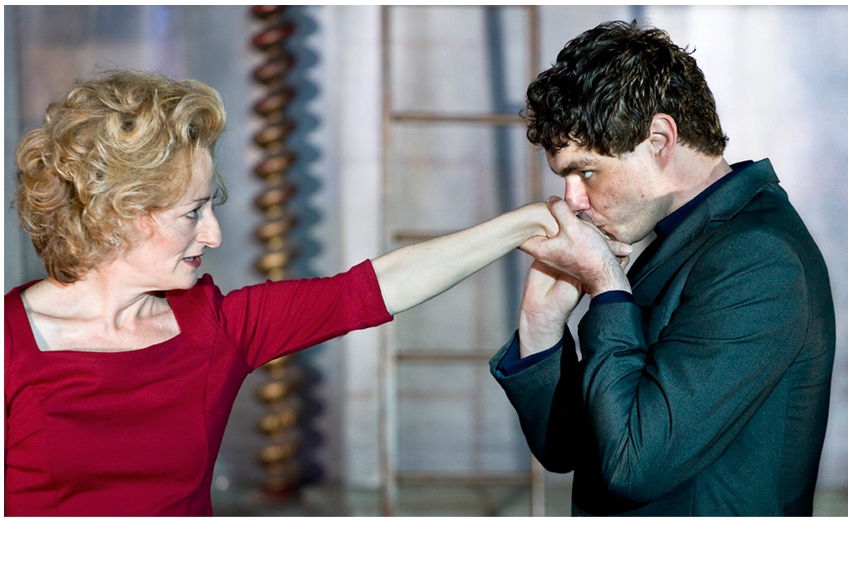Long may it lie in ruins. Wilton’s Music Hall, in the East End of London, is a wondrous slice of Victoriana which exploits its failing grandeur to the max. All visitors are implored to find a couple of quid for the restoration effort. But decay and dilapidation are the best things about it. Every wrinkled façade, every petal of tarnished gilding, is like a tear shed for an age that will never return. It’s wonderful. The administrators have realised this, too. Ruination is their main selling point. The cover of the brochure shows a heart-rending image of the terracotta entrance flaking and declining beautifully. If the renovation campaign were to find enough loot for a proper facelift, the place would go bust overnight. No one wants a squeaky-clean music hall.
Like a restaurant with a great view and lousy food, the venue is superbly indifferent to the quality of its drama. Timberlake Wertenbaker’s new version of Britannicus, by Racine, plunges us into the final years of the Julio-Claudian dynasty. The young emperor Nero (Matthew Needham), still influenced by his spiky, scheming mother (Siân Thomas), wants to marry the fiancée of Britannicus, his stepbrother. First he needs to bump off the human impediment with a dose of arsenic hidden in a bread roll. This is a relentlessly cruel world where every character is either a heartless psycho or a bewildered victim.
Irina Brown’s production skips the Roman Empire by a couple of thousand years and sets the action in the present day. Which doesn’t help. The stage is wrapped in see-through plastic sheets. There are big arc-lamps standing around glaring at the stage, like Nosey Parkers. And with the cast togged up in cheap supermarket clothing, the whole thing feels like a photoshoot for the Primark winter catalogue.
The emotional pitch is identical throughout. Fraught, tense, on edge. Nearly every line is either yelled or simpered. And much of the acting is drawn from an album of Obvious Gestures. To invoke the gods, you fling your arms skywards. To suggest blame, you jab an accusing finger. For exhilaration, you spin on one foot and clap your hands triumphantly. For sadness or humiliation, you frown while crumpling your shoulders in a bit and letting your bent wrist tremble. It’s hard to feel engaged with any of this glib, superficial action. And one’s eye, inevitably, wanders up towards the splendid dereliction of the ceiling, the pock-marked pillars, the syphilitic brickwork, and the fabulous barley-sugar columns supporting the gallery. It’s amazing, this place. Let’s hope the restoration project comes a cropper.
At Hampstead, Nicholas Wright’s new play, The Last of the Duchess, promises to expose the weird world of Wallis Simpson in her final years. Wright, as always, is excellent at atmosphere and hopeless at structure. Twenty minutes into the play there’s an interval. The second half lasts about an hour and a quarter. This is very unsettling.
The opening scene shows Wallis, in her prime, as a majestic, frosty, foul-mouthed and hard-drinking slut. A disaster for the play. First, it whips away any sympathy we might feel for Wallis. Secondly, it creates the expectation that we’ll see her again. But she retires upstairs — to spend a record-breaking 14 years on her deathbed — while the script turns into a tussle for control of her estate.
Wallis’s ferocious French attorney, Suzanne Blum, is contacted by a gin-swilling English novelist, Lady Caroline Blackwood, who wants to interview Wallis for the Sunday Times. Lady Caroline is immediately suspicious of Blum’s threats and evasions. Is she looting Wallis’s jewellery? Why won’t she let her mistress have a tipple of gin? Is the duchess perhaps already dead?
The play shines in its skilful portrayal of three smart, tough, vulnerable women. Anna Chancellor, as Lady Caroline, gives a raunchily engaging picture of an emotional car-crash. Sheila Hancock, icily convincing as Blum, becomes more appealing as the action progresses. The daughter of a Jewish butcher, Blum overcame anti-female prejudice to build a thriving legal practice in France. With the rise of Hitler, she was forced to emigrate to America where she created a new career from scratch. She perfectly embodies the lawyer/gangster archetype. When she isn’t firing off writs she’s threatening her enemies with the mob.
Best of all is Angela Thorne in a cameo as Diana Mosley. The production has the courage to present her as a charming old dear. Thorne captures her brilliantly, the poise, the detachment, the antique accent, the imperious but essentially kindly way with the servants. We warm to her even when she boasts that her husband (‘Srawswald’ as she drawlingly calls him) would have made a great prime minister ‘if only the British had come to their senses’. These details are wonderful. With a more intelligent design this play might have become a classic.







Comments